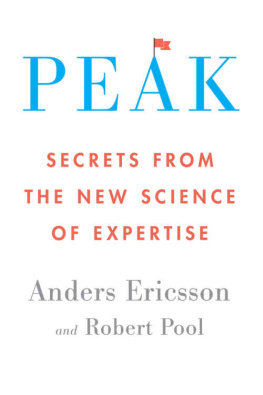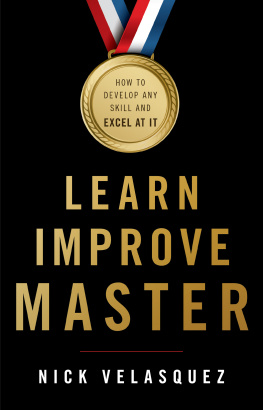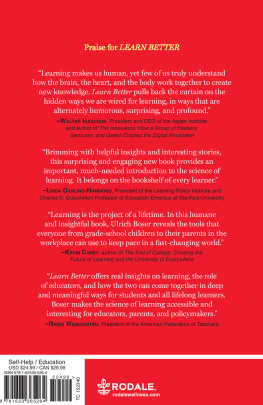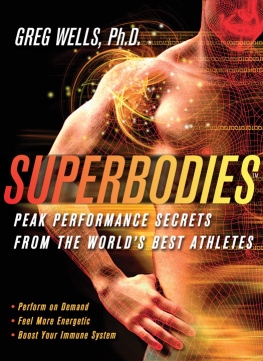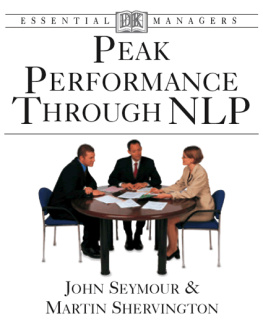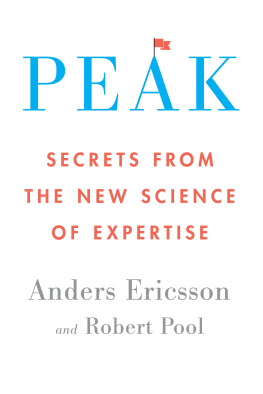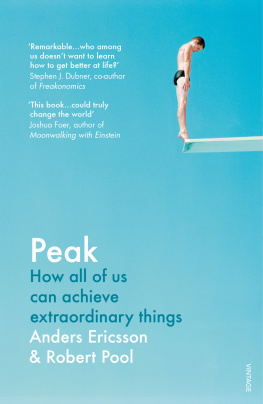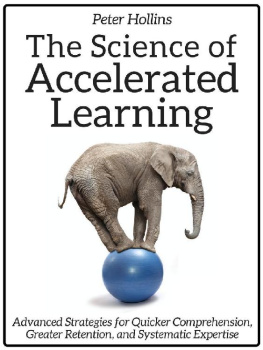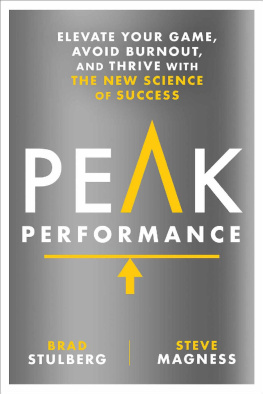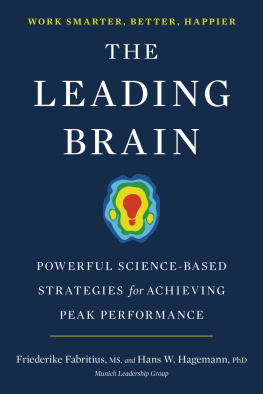Copyright 2016 by K. Anders Ericsson and Robert Pool
All rights reserved.
For information about permission to reproduce selections from this book, write to or to Permissions, Houghton Mifflin Harcourt Publishing Company, 3 Park Avenue, 19th Floor, New York, New York 10016.
www.hmhco.com
Library of Congress Cataloging-in-Publication Data
Names: Ericsson, K. Anders (Karl Anders), date, author.
Title: Peak : secrets from the new science of expertise / Anders Ericsson and Robert Pool.
Description: Boston : Houghton Mifflin Harcourt, 2016. | An Eamon Dolan book. | Includes bibliographical references and index.
Identifiers: LCCN 2015042796 (print) | LCCN 2016005877 (ebook) | ISBN 978-0-544-45623-5 (hardcover) | ISBN 978-0-544-80970-3 (trade paper) | ISBN 978-0-544-45625-9 (ebook)
Subjects: LCSH : Expertise. | Ability. | PerformancePsychological aspects.
Classification: LCC BF378.E94 E75 2016 (print) | LCC BF378.E94 (ebook) |
DDC 153.9dc23
LC record available at http://lccn.loc.gov/2015042796
Cover design by Brian Moore
v1.0416
To my wife, Natalie, for facilitating and encouraging my efforts to keep pushing beyond my current level of understanding of expert performance and getting closer to the peak.
A. E.
To my soul mate and my muse, Deanne,
who taught me
much of what I know about writing,
most of what I know about living,
and all of what I know about love.
R. P.
Authors Note
This book is the product of a collaboration between two people, a psychological scientist and a science writer. We began talking regularly about the subjectexpert performers and deliberate practicemore than a decade ago and began serious work on the book more than five years ago. During that time the book grew in the give-and-take between the two of us to the point that it is now difficult even for us to tell exactly who is responsible for which piece of it. What we do know is that it is a much betterand differentbook than either of us would have produced alone.
However, while the book is a collaboration, the story that it tells is the story of just one of us (Ericsson), who has spent his adult life studying the secrets of extraordinary performers. Thus, we chose to write the book from his point of view, and the I in the text should be understood as referring to him. Nonetheless, the book is our joint effort to describe this exceptionally important topic and its implications.
Anders Ericsson
Robert Pool
October 2015
Introduction:
The Gift
W HY ARE SOME PEOPLE so amazingly good at what they do? Anywhere you look, from competitive sports and musical performance to science, medicine, and business, there always seem to be a few exceptional sorts who dazzle us with what they can do and how well they do it. And when we are confronted with such an exceptional person, we naturally tend to conclude that this person was born with something a little extra. He is so gifted, we say, or, She has a real gift.
But is that really so? For more than thirty years I have studied these people, the special ones who stand out as experts in their fieldsathletes, musicians, chess players, doctors, salespeople, teachers, and more. I have delved into the nuts and bolts of what they do and how they do it. I have observed, interviewed, and tested them. I have explored the psychology, the physiology, and the neuroanatomy of these extraordinary people. And over time Ive come to understand that, yes, these people do have an extraordinary gift, which lies at the heart of their capabilities. But it is not the gift that people usually assume it to be, and it is even more powerful than we imagine. Most importantly, it is a gift that every one of us is born with and can, with the right approach, take advantage of.
THE LESSON OF PERFECT PITCH
The year is 1763, and a young Wolfgang Amadeus Mozart is about to embark on a tour around Europe that will jump-start the Mozart legend. Just seven years old and barely tall enough to see over the top of a harpsichord, he captivates audiences in his hometown of Salzburg with his skill on the violin and various keyboard instruments. He plays with a facility that seems impossible to believe in someone so young. But Mozart has another trick up his sleeve that is, if anything, even more surprising to the people of his era. We know about this talent because it was described in a rather breathless letter to the editor about the young Mozart that was published in a newspaper in Augsburg, Mozarts fathers hometown, shortly before Mozart and his family left Salzburg for their tour.
The letter writer reported that when the young Mozart heard a note played on a musical instrumentany notehe could immediately identify exactly which note it was: the A-sharp in the second octave above middle C, perhaps, or the E-flat below middle C. Mozart could do this even if he was in another room and could not see the instrument being played, and he could do it not just for the violin and fortepiano but for every instrument he heardand Mozarts father, as a composer and music teacher, had nearly every imaginable musical instrument in his house. Nor was it just musical instruments. The boy could identify the notes produced by anything that was sufficiently musicalthe chime of a clock, the toll of a bell, the ah-choo of a sneeze. It was an ability that most adult musicians of the time, even the most experienced, could not match, and it seemed, even more than Mozarts skill on keyboard and violin, to be an example of the mysterious gifts that this young prodigy had been born with.
That ability is not quite so mysterious to us today, of course. We know a good deal more about it now than 250 years ago, and most people today have at least heard of it. The technical term is absolute pitch, although it is better known as perfect pitch, and it is exceptionally rareonly about one in every ten thousand people has it. It is much less rare among world-class musicians than among the rest of us, but even among virtuosos it is far from normal: Beethoven is thought to have had it; Brahms did not. Vladimir Horowitz had it; Igor Stravinsky did not. Frank Sinatra had it; Miles Davis did not.
It would seem, in short, to be a perfect example of an innate talent that a few lucky people are born with and most are not. Indeed, this is what was widely believed for at least two hundred years. But over the past few decades a very different understanding of perfect pitch has emerged, one that points to an equally different vision of the sorts of gifts that life has to offer.
The first hint emerged with the observation that the only people who had received this gift had also received some sort of musical training early in their childhood. In particular, a good deal of research has shown that nearly everyone with perfect pitch began musical training at a very young agegenerally around three to five years old. But if perfect pitch is an innate ability, something that you are either born with or not, then it shouldnt make any difference whether you receive music training as a child. All that should matter is that you get enough musical trainingat any time in your lifeto learn the names of the notes.
The next clue appeared when researchers noticed that perfect pitch is much more common among people who speak a tonal language, such as Mandarin, Vietnamese, and several other Asian tongues, in which the meaning of words is dependent on their pitch. If perfect pitch is indeed a genetic gift, then the only way that the tonal-language connection would make sense would be if people of Asian ancestry are more likely to have genes for perfect pitch than people whose ancestors came from elsewhere, such as Europe or Africa. But that is something that is easy to test for. You just recruit a number of people of Asian ancestry who grew up speaking English or some other nontonal language and see if they are more likely to have perfect pitch. That research has been done, and it turns out that people of Asian heritage who dont grow up speaking a tonal language are no more likely than people of other ethnicities to have perfect pitch. So its not the Asian genetic heritage but rather learning a tonal language that makes having perfect pitch more likely.

